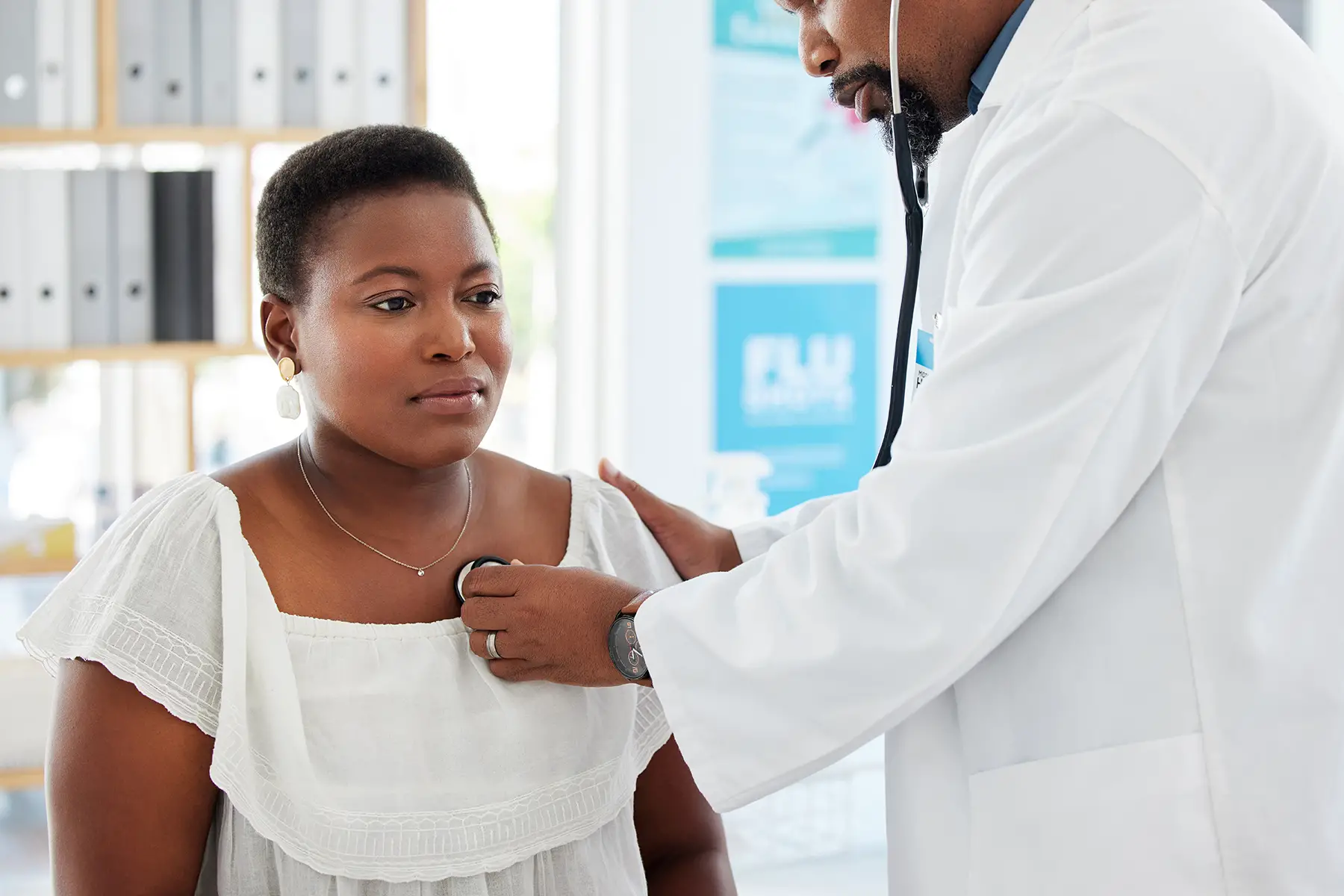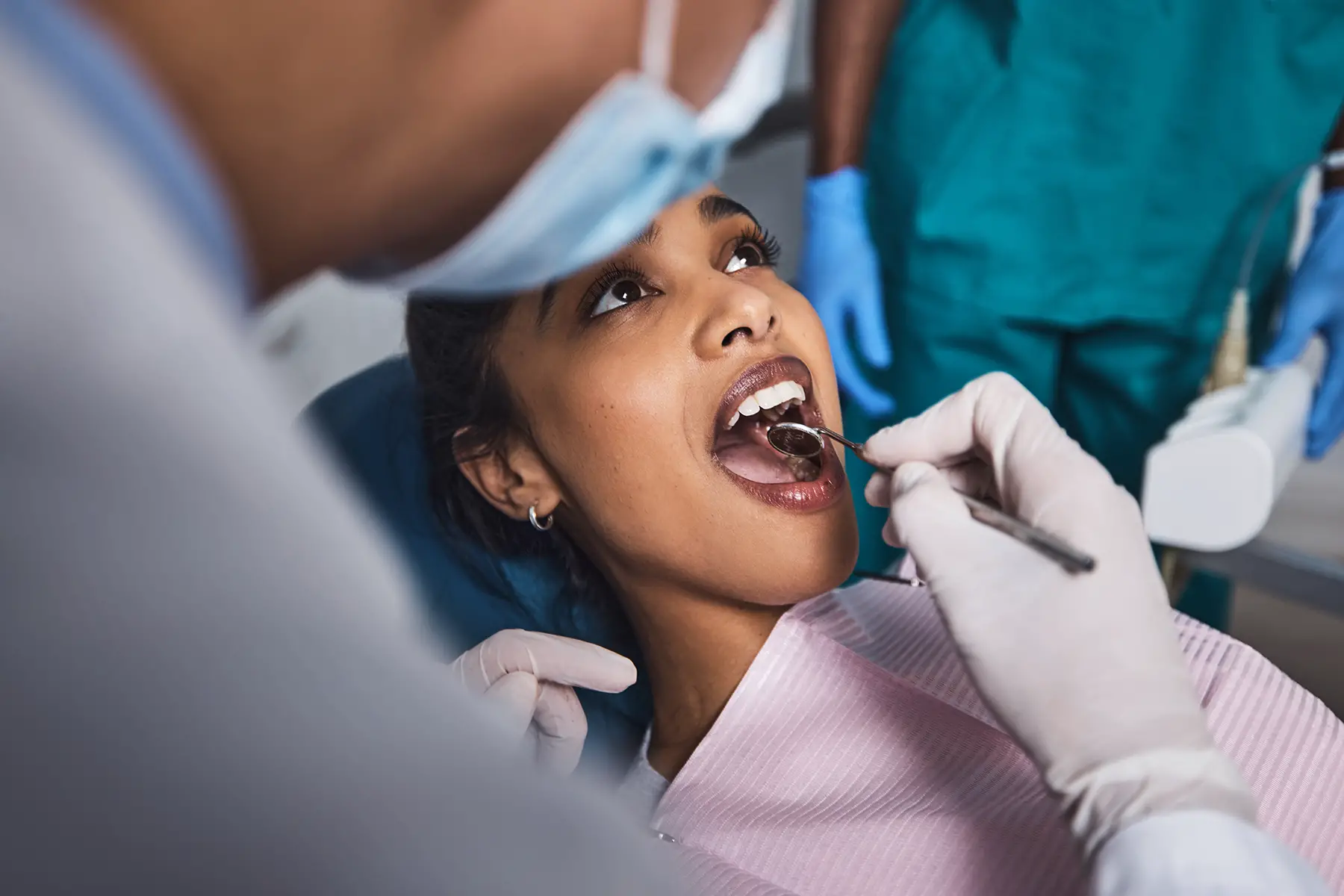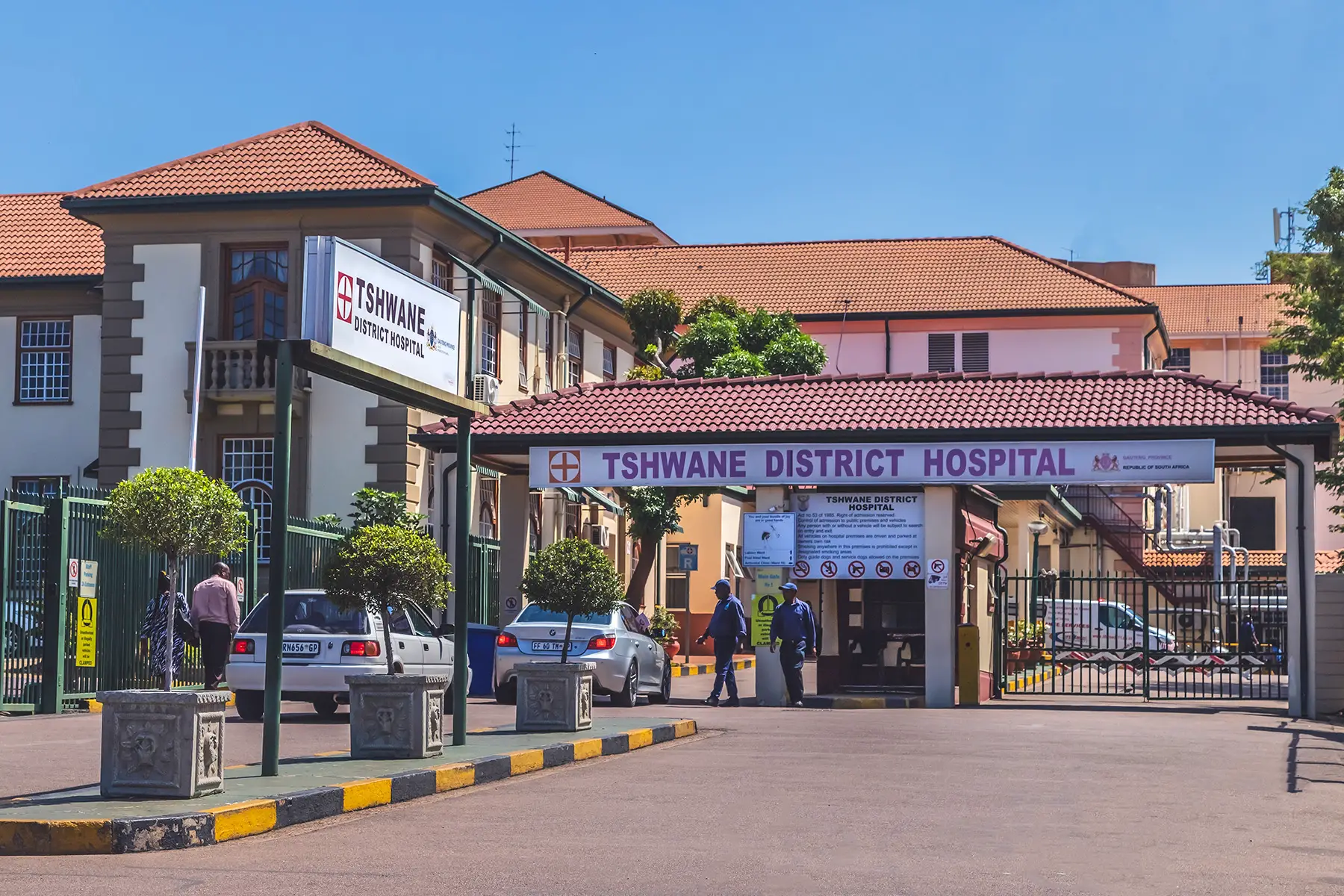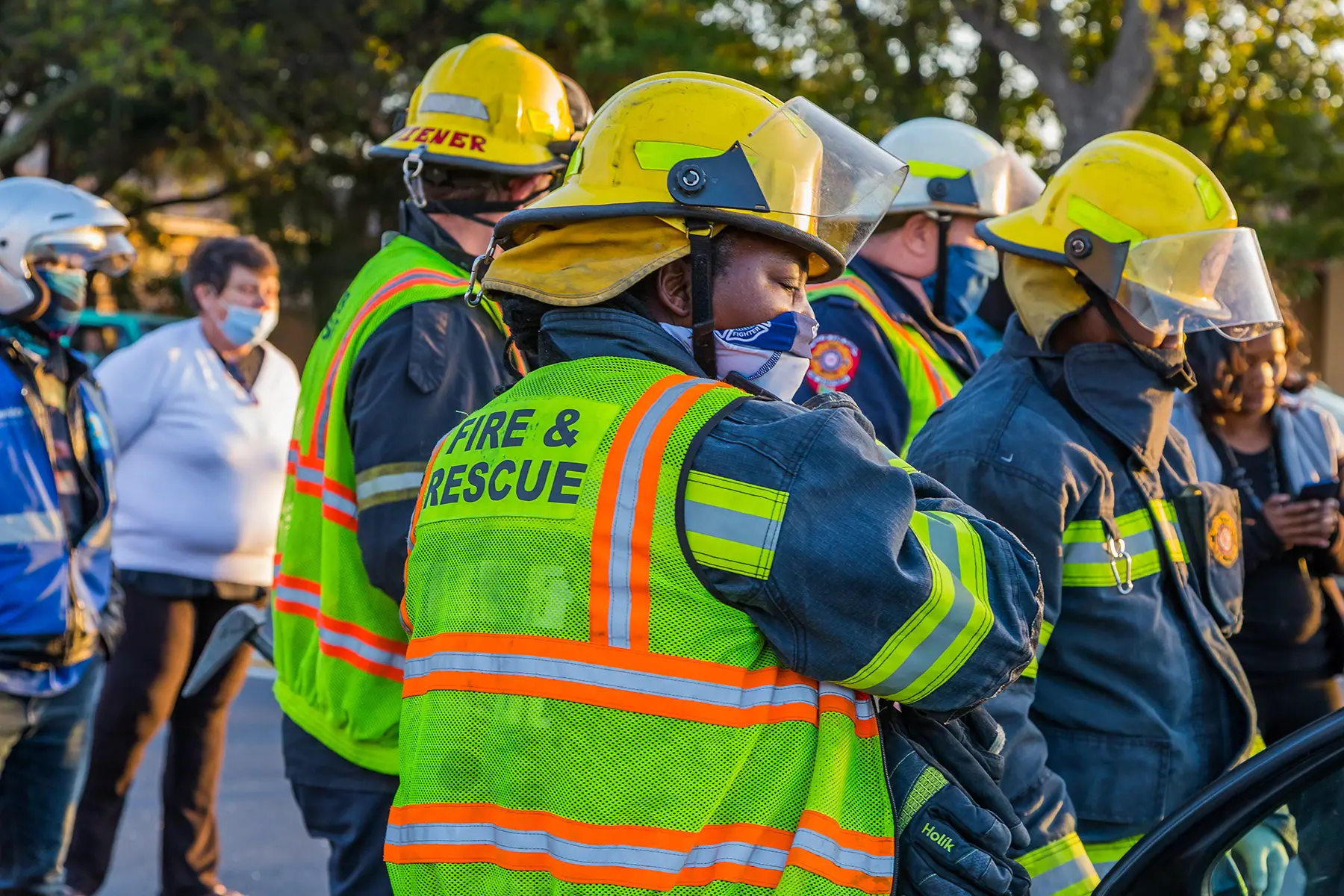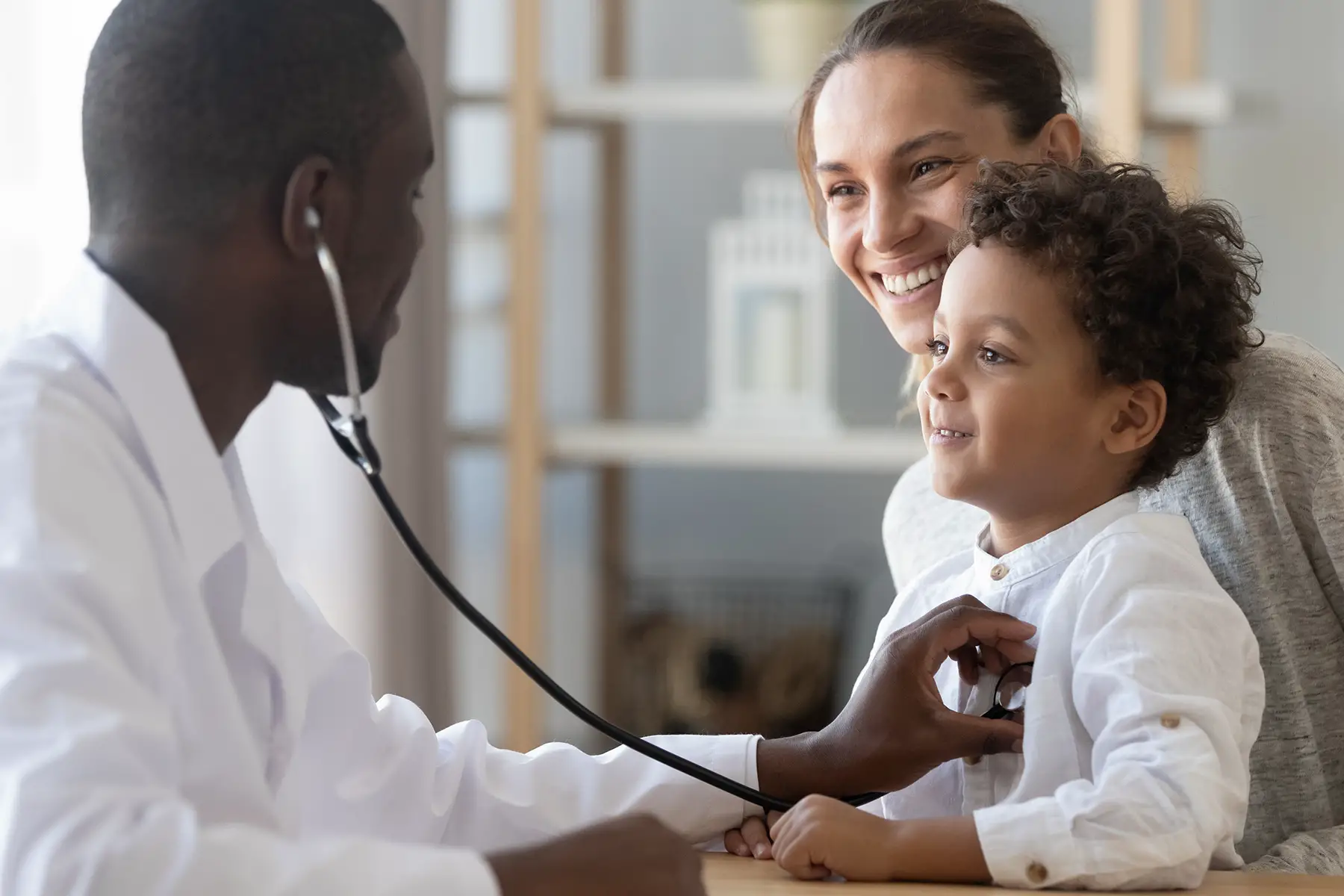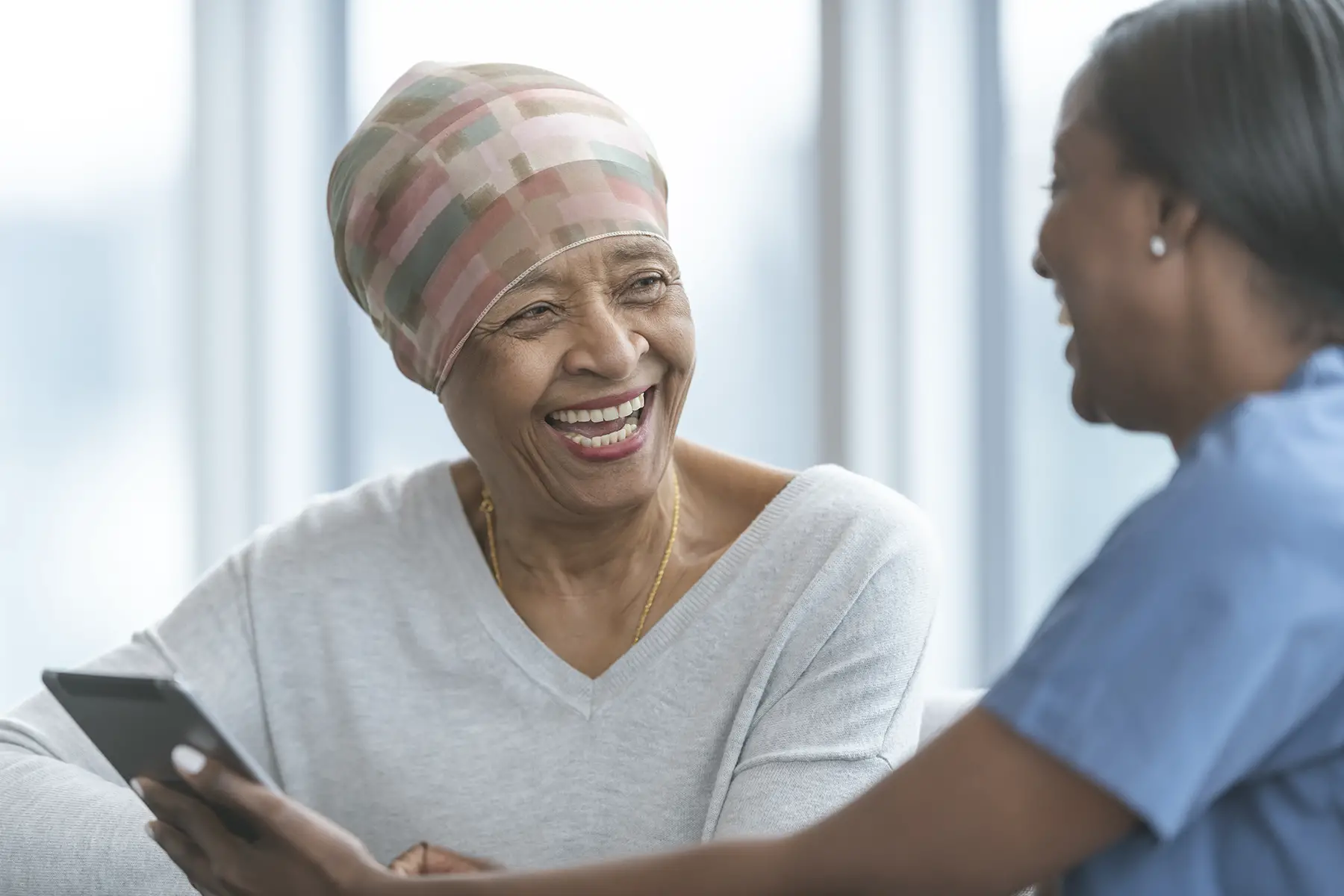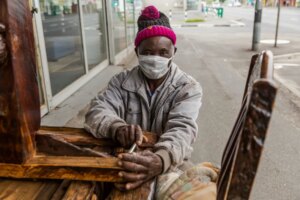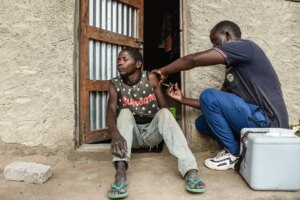Healthcare in South Africa can feel like choosing between two worlds. Public clinics offer affordability and open doors to everyone, but often at the price of long lines and outdated facilities. Meanwhile, the private sector boasts modern hospitals, cutting-edge treatments, and shorter waits, but only if your wallet can handle it.
Whether you’re a resident or an expat, understanding how the system works – and which one fits your needs – can be the difference between seamless treatment and a frustrating ordeal.
Let’s break down your options:
- How does healthcare work in South Africa?
- Who has access to healthcare in South Africa?
- Do I need private healthcare in South Africa?
- How to register for South African healthcare
- Overview of primary care in South Africa
- Alternative medicine in South Africa
- Practical medical phrases in South Africa
- Useful resources
Cigna Global
Want access to the best private medical services in South Africa? Speak to the healthcare professionals at Cigna Global today and find a policy that’s right for you. Take advantage of their global network of doctors, specialists, therapists and more with coverage tailor-made for you and your family. Get peace of mind with Cigna Global.
How does healthcare work in South Africa?
Public vs private healthcare in South Africa
The South African healthcare system (Zulu: inkqubo yezempilo, Xhosa: uhlelo lwezempilo, Afrikaans: gesondheidsorg) is a mix of public and private medical services, which work in parallel to each other.
Although the public sector offers free or low-cost medical care, around 16% of the population relies on private health insurance to access higher-quality healthcare more quickly.

South Africa’s healthcare system is set for a major overhaul in the coming years. In May 2024, President Cyril Ramaphosa approved the National Health Insurance (NHI) law, which will create a state fund to provide universal quality healthcare and heavily reduce the role of private insurance plans.
However, the law faces strong opposition from within and outside the government. Even the SA Medical Association (SAMA – a non-statutory doctor’s association) has called the legislation dangerously flawed, warning that it “risks collapsing our healthcare system rather than strengthening it.” In April 2025, SAMA announced it would challenge the law’s constitutionality in the High Court.
As a result, the roll-out of the National Health Insurance Fund is expected to be delayed for at least a few more years.
Is South Africa’s healthcare system good?
Although South Africa’s healthcare system is the best on the continent, it has its challenges. For example, there is a large quality gap between public and private healthcare services. Public health clinics are chronically underfunded and understaffed, and cope with long waiting times and overcrowding. Meanwhile, around 80% of doctors work in the private sector.
South Africa ranks 50th out of 94 on the 2024 Global Healthcare Index, suggesting that the country has some room for improvement. The 2023 Legatum Prosperity Index is a little less hopeful, ranking the healthcare system 77th out of 167, with a score of 56.0/100. The index rates South Africa’s overall health score even worse (place 129th) due to the prevalence of communicable and non-communicable diseases and the population’s poor mental health and high mortality rate.
The Academy of Science of South Africa agrees with the mediocre score. It finds that, although the healthcare system has “pockets of excellence”, it suffers from widespread problems caused by its historical context of colonisation, exclusion, fragmentation, and inequity.
Who administers South African healthcare?
The national government – more specifically, the National Department of Health (DOH) – regulates healthcare in South Africa. It sets the country’s health policy and strategy and determines its long-term health goals. Meanwhile, the Office of Health Standards Compliance (OHSC) monitors healthcare safety and quality standards, and the Council for Medical Schemes (CMS) regulates the health insurance industry, making sure insurance providers comply with government legislation.
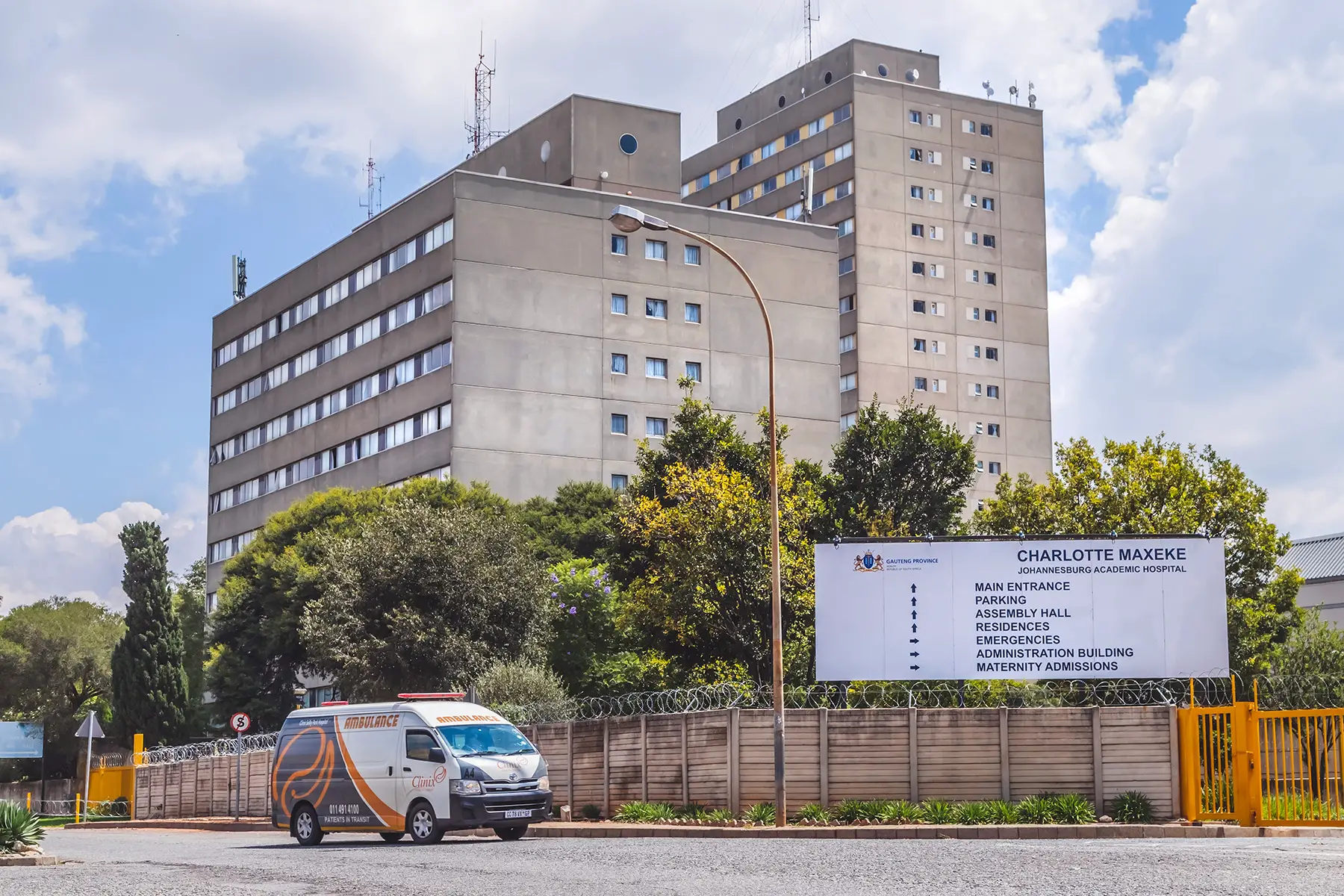
On a local scale, each of South Africa’s nine provinces manages its own health budget, plans, and infrastructure. The Provincial Departments of Health are responsible for the organization and delivery of health services in their area, meaning they’re responsible for deciding where clinics and hospitals are actually built.
Finally, nurse practitioners, medical officers, and community service doctors act as gatekeepers to specialist and hospital care.
Does South Africa have free healthcare?
Yes and no. The public healthcare system is funded by government spending, donor funding, and (nominal) copayments.
While treatments are heavily subsidized, they are not always 100% free. Instead, patients are charged small fees based on their income (called the Uniform Patient Fee Schedule – UPFS). Vulnerable groups (e.g., children, low-income adults, and patients with chronic conditions) often receive free care.
Of course, when you visit a private health center, you must either have the insurance cover it or pay for it yourself.
Who has access to healthcare in South Africa?
Like many countries, South Africa believes that affordable healthcare is a fundamental right. As such, everyone can access medical care to some degree or another. Notably, asylum seekers, refugees, and undocumented immigrants are also guaranteed access to essential help.
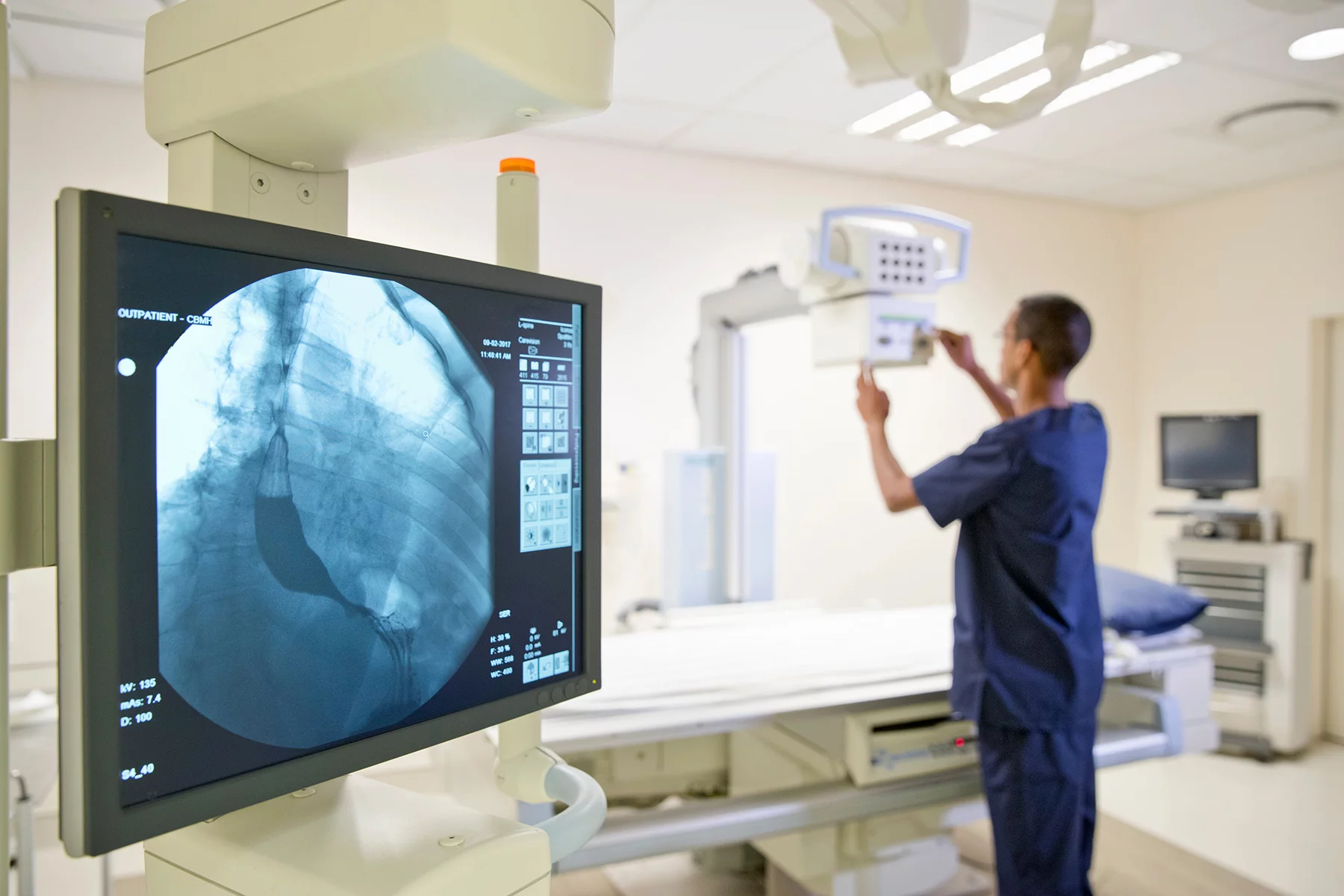
Normally, we would now explain that you would have to register for public insurance to access medical treatment. However, South African health services generally work on a walk-in basis. This means genuinely everyone can access medical treatment by just showing up.
Can expats register for healthcare in South Africa?
Expats can also access public healthcare, regardless of their residency status. If you require specialist treatment, you will need to have a valid visa.
Naturally, foreign residents living in South Africa can also opt for a private medical plan to cover any treatment costs.
Do I need private healthcare in South Africa?
While frankly everyone can access public healthcare, this also means that medical centers are often severely overcrowded and have notoriously long waiting times. The public system is also underfunded, understaffed, and struggling to update its equipment.
The private sector has more modern health facilities, shorter wait times, and offers (much) higher quality care. Private insurance plans also cover more treatments and require less copayments than the public sector.
Why get private healthcare in South Africa?
There are many benefits to getting medical insurance in South Africa. Like we said earlier, the private sector covers more treatments. For example, if you’re an adult needing more complex dental care, it’s not covered by the public sector.
Aside from that, other benefits of private health insurance include:
- No copayments
- Higher quality care
- Shorter waiting times
- Direct access to modern facilities
- Higher levels of privacy and comfort
Private healthcare providers in South Africa
South African and international insurers offering medical insurance plans include:
See our article on medical aid and insurance in South Africa for more information.
How to register for South African healthcare
Before any medical issue arises, you’ll need to decide which healthcare option to go for – public or private.

If you choose to take the public route, you can directly apply for healthcare with your local clinic or hospital. In South Africa, healthcare services generally work on a walk-in basis, meaning they’re also responsible for the registration process. You typically need to provide your ID and visa, proof of income (e.g., salary slips or tax certificate), and proof of residence.
If you decide to go to a private care facility, you’ll first need to take out a medical insurance plan. To do so, you can contact your preferred insurer directly. They will be more than happy to walk you through the registration process. Beware of pushy salespeople, though! You might walk away with a completely different policy plan than you had in mind.
After that, you’ll receive your Medical Aid Membership Card in about three to eight business days. Many insurers also work with digital membership cards, which can be accessed immediately upon approval of your membership. You’ll need to take your card with you to all doctor appointments in order to access free healthcare.
Overview of primary care in South Africa
South African healthcare professionals
Types of doctors in South Africa
Nurse practitioners, medical officers, and community service doctors are the first point of contact in South Africa’s public health system. They often handle a wide range of conditions and work from public clinics or community health centers. You are free to choose whichever health center you prefer, but keep in mind that the public sector has long waiting lists.
If you can afford private healthcare, you can also see a private GP (General Practitioner). These doctors work in solo practices, small clinics, or group medical centres.
Both (public and private) coordinate follow-up treatments and can refer you to other medical specialists. These types of doctors work in hospitals and healthcare centers across South Africa.

In 2021, the country had 0.8 doctors per 1,000 residents. This is below the world average (1.7 doctors per 1,000 people) but above the regional average (0.2 doctors). Around 80% of doctors work in the private sector.
In 2020, there were also an estimated 1.03 nurses per 1,000 residents, a number shamefully low compared to the world average of 8.71 per 1,000 people.
Dentists
South Africa’s public healthcare system covers basic dental services, such as examinations, fillings, and tooth extractions. Depending on your income, these treatments may require a copayment. Of course, if you see a private dentist, you’ll need private insurance or pay out of pocket.
Unfortunately, the country has a dire shortage of oral health practitioners. In March 2024, the Health Professions Council of South Africa (HPCSA) counted 6,866 registered dentists, who serve a population of 63.2 million people. This translates into 9,205 patients per dentist. Meanwhile, less than one-third of oral health professionals work in the public sector.
South African healthcare facilities
Healthcare centers and clinics
South Africa has many health clinics and medical centers (Zulu: isikhungo sezempilo somphakathi, Xhosa: isikhungo sezempilo sasekuhlaleni, Afrikaans: gemeenskapsgesondheidsentrum), particularly in urban areas.
Public clinics and community health centers are typically open from 08:00 to 16:00 on weekdays. For after-hours, non-emergency care, you can visit a 24-hour community health center (CHC), though availability can vary depending on the region.

Consultations at public healthcare facilities are often free or low-cost, but you may be required to pay a small fee for diagnostic tests and lab work.
South Africa also has specialized clinics providing services for mental health, sexual health, and chronic disease management. However, without a referral, these treatment centers require out-of-pocket payment or private insurance coverage.
You can find out more information about and search for services in your area through provincial DOH websites.
Hospitals in South Africa
There are two types of hospitals (Zulu: isibhedlela, Xhosa: isibhedlele, Afrikaans: hospitaal) in South Africa: state-run public hospitals and privately run hospitals. Both are regulated by the National DOH.
If you need immediate medical assistance, go to the nearest emergency room (Zulu: eziphuthumayo, Xhosa: emergency, Afrikaans: noodkamer). You can also call 10177 for ambulance services or 112, the free national emergency number.
In 2022, South Africa had 478 public hospitals and over 276 private hospitals. You can read more about hospital stays and treatments in our dedicated country article.
Pharmacies in South Africa
There are around 3,580 pharmacies (Zulu: isitolo samakhambi, Xhosa: ilebhu yamayeza, Afrikaans: Apteek) in South Africa, so you probably don’t have to travel too far to find one.
Many of these are located in or near health clinics, hospitals, malls, and shopping centers. You can recognize them by their signs (indicating pharmacy or dispensary); some may also have display symbols like the cross or Staff of Asclepius.
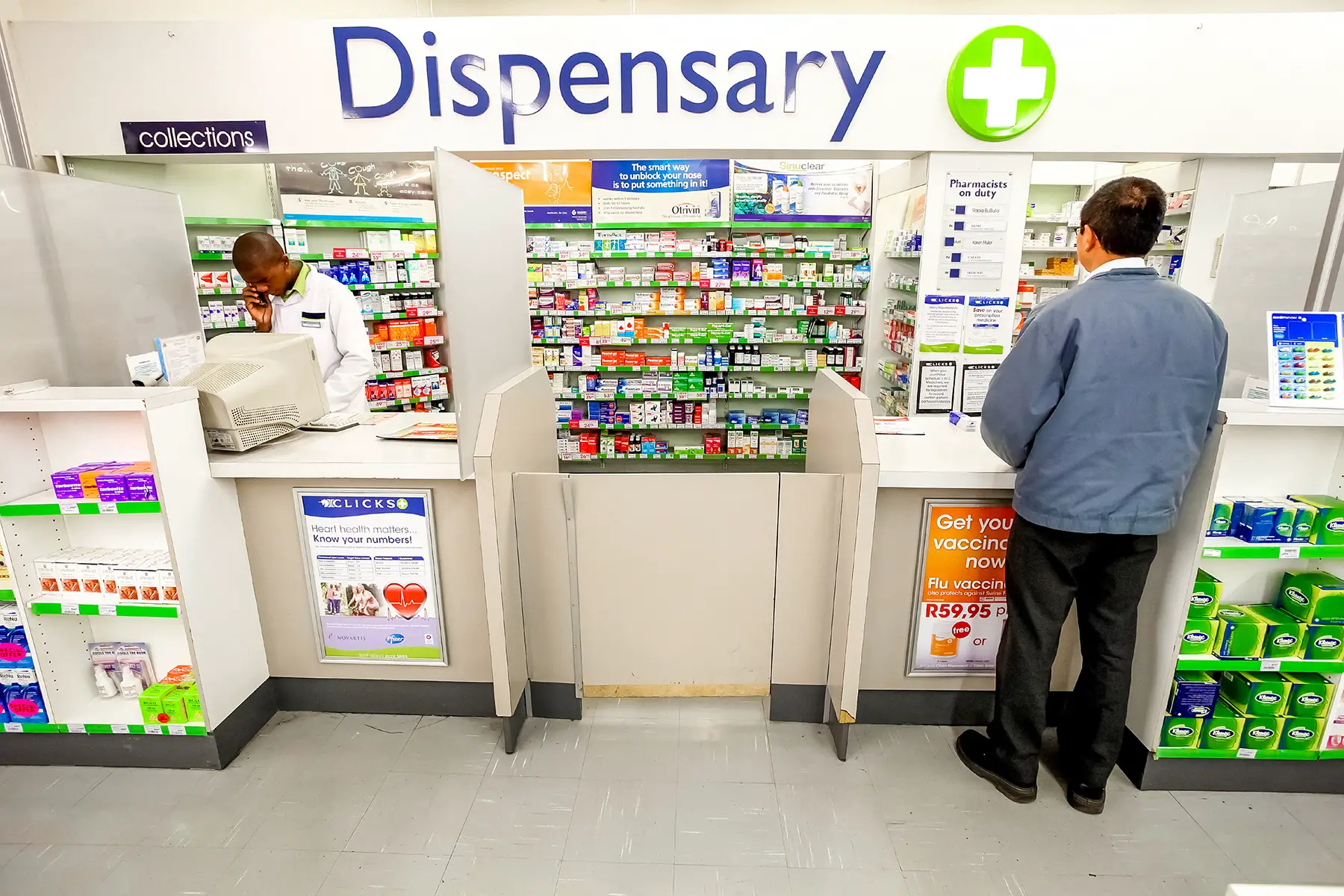
Opening hours are usually from 08:00 to 17:00, Monday to Friday. Pharmacies in malls or shopping centers often stay open later, especially in larger cities. Large cities also have 24-hour pharmacies that provide services at any time of day.
When you pick up prescription medication at a public hospital or clinic, it is often low-cost or free. If you go to a private pharmacy, the cost will depend on your insurance coverage. Private pharmacists will send the bill directly to your insurer if they have a contract with them; if not, you’ll need to pay upfront and claim it back later.
Pharmacies in South Africa do not allow you to pay in installments.
To find your nearest pharmacy, you can use any search engine or check with your local DOH. You can also use an online platform like Dis-Chem or Pharmacy Direct to have your medication delivered to your doorstep.
Specialized healthcare in South Africa
Mental healthcare
Patients struggling with addiction or mental health issues can seek treatment at a community mental health center (Zulu: isikhungo sezempilo yengqondo, Xhosa: iziko lezempilo yengqondo, Afrikaans: geestesgesondheidsentrum). These facilities often have multi-disciplinary teams that include social workers, occupational therapists, nurses, and other mental health professionals. For more serious conditions, you may be committed to a mental health institution.
Mental problems and disorders still face high levels of stigma in South Africa. The country’s mental health services are widely criticized for being inadequate, under-resourced, and inaccessible to much of the population.
Most services are located in urban centers, leaving rural and township populations with (almost) no access. Long waiting times and overcrowding are common in public health centers, while private centers are practically unaffordable and receive limited coverage from health insurance plans.

Many patients rely on NGOs like the South African Depression and Anxiety Group (SADAG) or the South African National Council on Alcoholism and Drug Dependence (SANCA) for accessible and reliable care.
Children’s healthcare
Children up to the age of 6 receive free medical treatment, including childhood vaccinations and basic dental care. After that, public services are still subsidized, but costs may apply depending on the facility and the family’s income level.
You can register your child with the same health center as yourself. These clinics offer pediatric care as well, or can refer to specialist hospitals if necessary.
Women’s healthcare
Public healthcare only covers essential healthcare services for women, such as diagnostic services related to pregnancy, HIV testing, antenatal care, and certain cancer screenings.
Other services, such as non-referral gynecological visits, are rarely prioritized, leaving many women to either face long waiting times or take the private route at their own expense.

Indeed, the accessibility and quality of women’s healthcare are often inadequate, especially in rural areas. Many public clinics are underresourced and overcrowded, resulting in long waiting times and rushed consultations. And while birth control is generally free, the country struggles with supply shortages and a lack of awareness.
The right to an abortion has been legal in South Africa since 1996, allowing women to voluntarily terminate a pregnancy in the first 12 weeks. However, the implementation is problematic. For example, despite legal requirements, many public hospitals and clinics do not provide abortion services. Likewise, there are widespread reports of healthcare workers refusing to terminate pregnancies due to personal or religious beliefs, even though this is not legally allowed.
Women who want to exercise their legal rights can seek help from organizations like the Sexual and Reproductive Justice Coalition (SRJC) and Marie Stopes South Africa.
For more information on women’s healthcare, please read our detailed articles on healthcare, having a baby, and sexual health in South Africa.
Alternative medicine in South Africa
Traditional healing holds a significant role in South African healthcare. Many patients consult diviners (Zulu: sangomas, Xhosa: amagqirha) and herbalists (Zulu: izinyanga, Xhosa: amaxhwele) for various physical, mental, and spiritual illnesses. These practitioners are often highly respected within communities, particularly in rural areas.
Other common forms of alternative medicine include acupuncture, homeopathy, herbal medicine, traditional healing, osteopathy, reflexology, and other complementary therapies.

Depending on your location and desired treatments, you can access natural and holistic treatments at specialized health clinics, wellness centers, health shops, or through traditional healers.
Private insurance plans cover some alternative medicines, though this varies greatly per insurer. Typically, acupuncture, chiropractic care, and homeopathy are more likely to be covered than traditional Indigenous African healing methods. Be sure to check your policy carefully before scheduling an appointment.
Practical medical phrases in South Africa
South Africa’s healthcare system primarily uses English as its go-to language, and you’ll not likely need to speak Zulu, Xhosa, Afrikaans, or any of the country’s 12 official languages. But it’s fun to learn, so here are some useful words and phrases:
| English | Zulu | Xhosa | Afrikaans |
| Help! | Siza! | Nceda! | Help! |
| Call an ambulance! | Shayela i-ambulensi! | Biza i-ambulensi! | Bel ‘n ambulans! |
| I’ve had an accident | Ngibe sengozini | Ndenze ingozi | Ek het ‘n ongeluk gehad |
| I feel like I’m dying | Ngizizwa ngifile | Ndiziva ndifile | Ek voel ek gaan dood |
| doctor’s office | ihhovisi likadokotela | iofisi kagqirha | dokter se kantoor |
| pain | ubuhlungu | intlungu | pyn |
| headache | ubuhlungu bekhanda | intloko ebuhlungu | hoofpyn |
| stomach ache | ubuhlungu besisu | intlungu yesisu | maagpyn |
| fever | umkhuhlane | umkhuhlane | koors |
| cough | ukukhwehlela | ukukhohlela | hoes |
| food poisoning | ubuthi bokudla | utyhefu lokutya | voedselvergiftiging |
| heart attack | isifo senhliziyo | isifo sentliziyo | hartaanval |
| prescription | umyalelo wokwelapha | umthetho weziyobisi | voorskrif |
| vaccine | umjovo | umjovo | entstof |
| x-ray | X-ray | X-ray | X-straal |
| CT scan | CT-scan | CT-scan | CT-skandering |
Useful resources
- Gov.za Health – official government website with information on the South African healthcare system
- National Department of Health (DOH) – official government website for the national health ministry in South Africa
- Office of Health Standards Compliance (OHSC) – official government website for the department responsible for monitoring healthcare safety and quality standards in South Africa
- Council for Medical Schemes (CMS) – official government website for the department that manages South Africa’s medical insurance industry
- Health Professions Council of South Africa (HPCSA) – official website for the regulatory body overseeing specific healthcare professions




